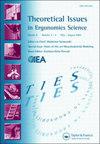Social stress in human-machine systems: opportunities and challenges of an experimental research approach
IF 1.4
Q4 ERGONOMICS
引用次数: 4
Abstract
Abstract This article presents some deliberations on methodological approaches to researching the effects of work-related social stress on performance, with particular consideration being given to machine-induced social stress. The article proposes a broad methodological approach to examine such effects. A particular focus is placed on performance after-effects (e.g. unscheduled probe tasks), extra-role behaviour, and task management behaviour because of conventional performance measures (i.e. scheduled tasks) often being unimpaired by social stressors. The role of the ‘performance protection mode’ as an important concept is discussed. A distinction is made between three facets of after-effects: performance-related, behavioural, and emotional. Unscheduled probe tasks and voluntary tasks are proposed to measure performance-related and behavioural after-effects. Propositions for specific experimental scenarios are made, allowing for sufficiently realistic simulations of social stress at work. The availability of such lab-based simulations of work environments offers good opportunities for this line of experimental research, which is expected to gain in importance since highly automated systems may modify the impact of human-induced social stress or may even represent a social stressor themselves. Finally, the considerations presented in this article are not only of relevance to the domain of social stress but to experimental stress research in general.人机系统中的社会压力:实验研究方法的机遇和挑战
摘要本文提出了一些研究工作相关社会压力对绩效影响的方法论方法,特别考虑了机器引起的社会压力。本文提出了一种广泛的方法来检验这种影响。由于传统的绩效衡量标准(即计划中的任务)通常不受社会压力因素的影响,因此特别关注绩效的后续影响(例如,未安排的探测任务)、角色外行为和任务管理行为。讨论了“性能保护模式”作为一个重要概念的作用。后遗症分为三个方面:与表现相关的、行为的和情感的。提出了非计划探测任务和自愿任务来测量与性能相关的和行为的后续效应。提出了特定实验场景的建议,允许对工作中的社会压力进行足够现实的模拟。这种基于实验室的工作环境模拟的可用性为这一系列的实验研究提供了很好的机会,因为高度自动化的系统可能会改变人类引起的社会压力的影响,甚至可能本身就是一个社会压力源,因此预计这将变得越来越重要。最后,本文提出的考虑因素不仅与社会压力领域有关,而且与一般的实验压力研究有关。
本文章由计算机程序翻译,如有差异,请以英文原文为准。
求助全文
约1分钟内获得全文
求助全文

 求助内容:
求助内容: 应助结果提醒方式:
应助结果提醒方式:


